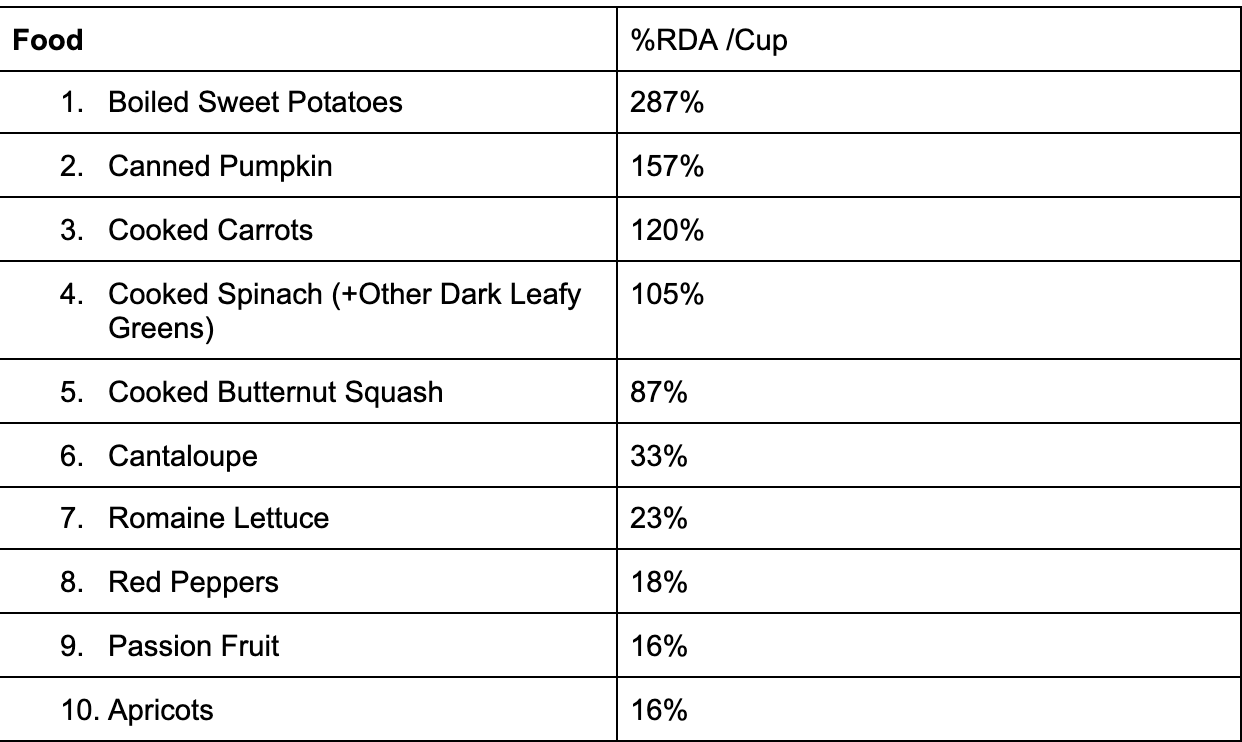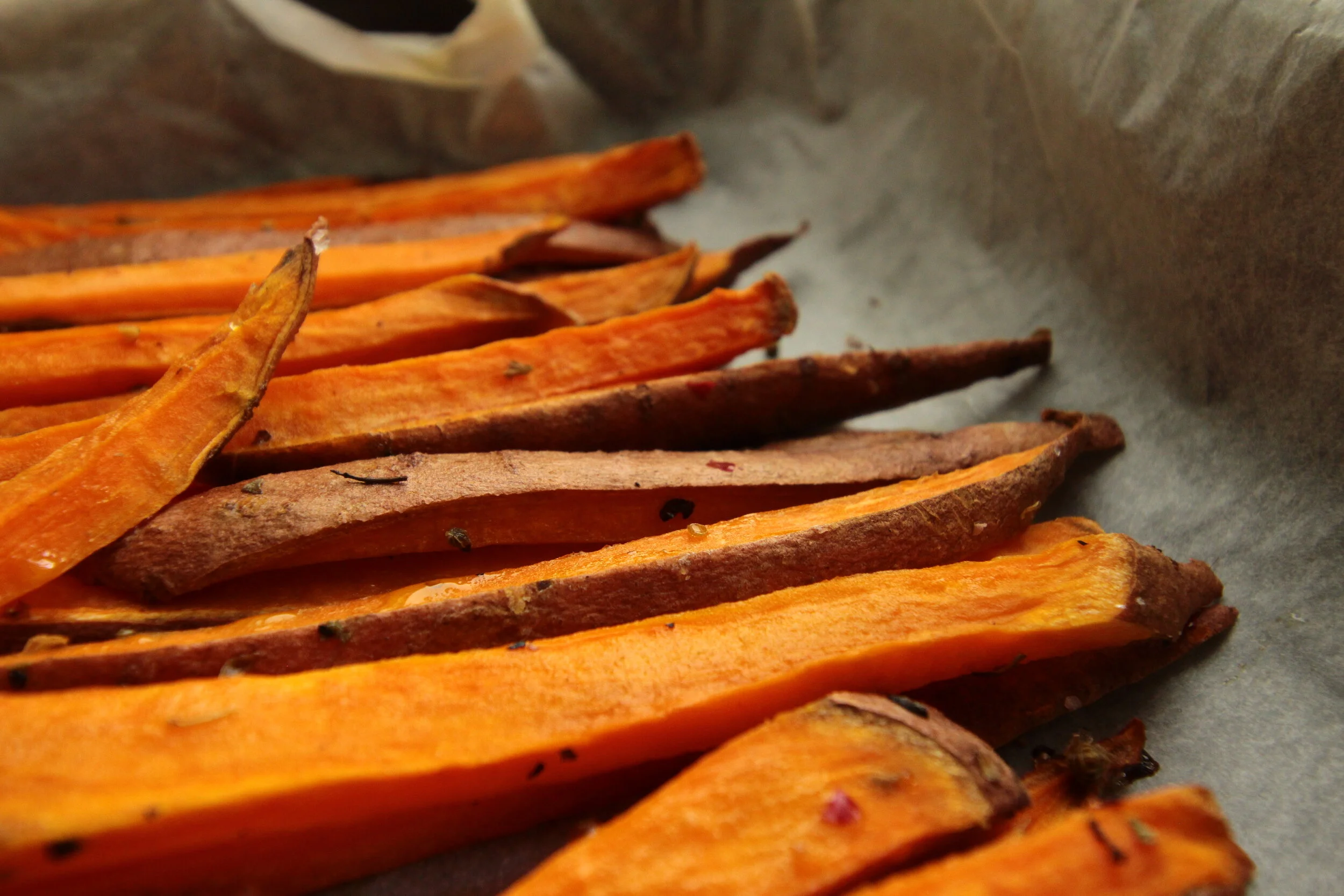Beta Carotene - The Cause of My Orange Hands
“What do you get when you drop a pumpkin?
Squash.”
Key Takeaways
Orange you glad that with Halloween just 48 hours away, the scent of pumpkin spice is thick in the air?
Though you don’t need more reason to load up on squash and sweet potatoes this season, I’m going to give you one - beta carotene.
Beta carotene, a compound most commonly found in orange and yellow vegetables, is linked with many positive health effects, including:
Improved Immune Function
Stronger Bones
Better Eye Health
Better Lung Health
Decreased Cancer Risk
Improved Skin Health
4. You may not want to take a beta carotene supplement, especially if you’re a smoker, but all will benefit eating a diet full of foods that rich this super nutrient.
Full Story
My orange hands are not caused by a genetic disorder, faulty liver function, or a spray tan gone horribly wrong. I live with Carotenosis, a benign and reversible medical condition characterized by excessive intake of beta carotene that results in an orange discoloration of the skin.
Put simply, my rosy hands and feet can be attributed to my consistently high intake of sweet potatoes, pumpkin, and carrots. Specifically, it is the pigment beta-carotene in these foods that gives them, and me, their beautiful deep orange-red color. Beta carotene is not just a coloring agent, though - it is a powerful antioxidant that is linked with improved immune function, better eye and lung health, and decreased risk of disease.
Whether you want to improve your health or justify your pumpkin spice addiction, here are the TOP 7 reasons you should load up your plate with beta carotene rich foods this fall.
You Can Thank Mr. Wackenroder
Beta carotene is an antioxidant found in fruits and vegetables that is converted to Vitamin A, a group of fat soluble vitamins that play an integral role in many physiological processes (1). The name “beta carotene” is derived from the Latin word for carrot and was “discovered” in 1831 by a man with one of the best names I’ve ever read, Heinrich Wilhelm Ferdinand Wackenroder.
In addition to the aforementioned orange fruits and vegetables, the foods with the highest concentration of beta carotene include:
Spinach and other dark leafy greens
Broccoli
Red bell peppers
Squash
Cantaloupe.
Why Should You Consume Beta Carotene?
1. Boosts Immune Function
Beta carotene consumption has been shown to enhance the function and increase the total number of immune cells (2). Researchers have also found that carotenoids decrease the immunosuppressive effects of aging and protect against neoplastic (tumor) development (3, 4).
2. Strengthens Bones
Beta carotene intake is positively associated with bone mineral density and inversely correlated with fracture risk (5, 6, 7). This study found that beta carotene intake prevented bone loss in mice that had their hind limbs unloaded (i.e. prevented from weight bearing) (8).
These findings suggest that high beta carotene intake may attenuate bone loss in the elderly, injured, or other that are unable to weight bear through their lower extremities for an extended period of time.
TOP TEN Foods Highest in Beta Carotene
In case you were wondering
3. Supports Eye Health
Beta carotene intake supports eye health and helps prevent age-related eye diseases (10).
You see (ha ha, get it), high levels of blood carotenoids have been shown to reduce risk of macular degeneration, the #1 cause of vision loss in those older than 60, by up to 35% (11).
4. Supports Lung Health
Vitamin A plays a role in cardiovascular health and has been shown to improve lung function (12). Vitamin A is critical for the formation of lung alveoli, the “sacs” where gas exchange takes place, and deficiency is associated with decreased lung function and increased risk of lung disease (13).
5. May Decrease Cancer Risk
A diet rich in beta carotene may decrease your risk of developing lung, pancreatic, and premenopausal breast cancer (14, 15). This study of over 2,500 people found an inverse relationship between carotenoid intake and rates of lung cancer (16).
6. Improves Skin Health
The antioxidant activity of beta carotene may increase your skin’s ability to protect itself against UV radiation and improve your skin’s appearance. This review found that beta carotene consumption offered photoprotective effects and contributed to the overall maintenance of skin health and appearance (17).
7. They Look Beautiful In A Fall Themed Or Thanksgiving Meal
Maybe you don’t love the taste of sweet potatoes or the idea of carrot soup doesn’t exactly tickle your fancy. That’s okay!
Regardless, they will fit right in alongside your pumpkin candles, scarecrows, and Thanksgiving centerpieces. Who knows - maybe seeing some beta carotene rich foods in a picturesque fall display will even help you develop a taste for them.
Caution: Avoid Beta Carotene Supplements (Maybe)
Too much of a good thing = a bad thing.
Long term, high dose beta carotene supplementation is associated with increased risk of cardiovascular disease and lung cancer in current and former smokers and those exposed to Abestos (18).
The good news - if you’re not a smoker or exposed to harmful chemicals, it appears high dose beta carotene supplementation poses no significant health risks (19). Regardless, why risk it?
For optimal health and safety, you’re always better off consuming vitamins, minerals, and antioxidants from whole foods rather than from isolated sources (supplements). Our bodies are smart - they can handle nearly all compounds packaged as food in nature. But by throwing a curveball at them in the form of megadose supplements, we risk adverse health effects.
Wrap Up
Whether you want to boost performance or live a long and healthy life, you can’t go wrong eating more beta carotene. Some ideas to incorporate more beta carotene into your life include:
Mix canned pumpkin into your oatmeal to add color and texture
Pair baby carrots or red bell peppers with hummus as a quick and easy snack
Throw some spinach, kale, or collard greens in with your eggs
Experiment with the versatile sweet potato - baked, boiled, microwaved or mashed, and as fries, toast, casserole, or straight up - the possibilities are endless.
Orange you glad that you now know the positive effects of high beta carotene consumption? This fall, and every season, remember all of the benefits of a diet full of beta carotene-rich foods. If your hands and feet turn orange, you’re doing it right.
Sources:
https://ods.od.nih.gov/factsheets/VitaminA-HealthProfessional/
https://link.springer.com/chapter/10.1007/978-1-4615-2900-2_11
https://www.clinicaleducation.org/resources/reviews/vitamin-a-the-key-to-a-tolerant-immune-system/#_ftn12
https://assets.researchsquare.com/files/rs-19336/v3/761db1a2-7ef6-4315-836d-beee0d9257e1.pdf
https://tools.myfooddata.com/nutrient-ranking-tool/Beta-Carotene/All/Highest/Household/Common/No
https://www.ncbi.nlm.nih.gov/pmc/articles/PMC5119484/
https://www.ncbi.nlm.nih.gov/pmc/articles/PMC6164133/#:~:text=Vitamin%20A%20is%20essential%20in,changes%20in%20the%20respiratory%20epithelium
https://www.frontiersin.org/articles/10.3389/fonc.2017.00023/full
https://academic.oup.com/ajcn/article/96/5/1179S/4577133
https://ods.od.nih.gov/factsheets/VitaminA-HealthProfessional/#h8
https://www.nccih.nih.gov/health/providers/digest/dietary-supplements-for-eye-conditions-science







